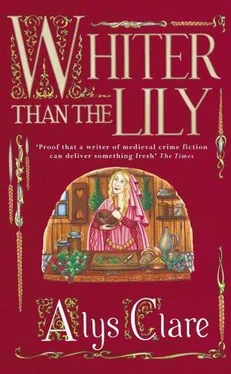Alys Clare - Whiter than the Lily
Здесь есть возможность читать онлайн «Alys Clare - Whiter than the Lily» весь текст электронной книги совершенно бесплатно (целиком полную версию без сокращений). В некоторых случаях можно слушать аудио, скачать через торрент в формате fb2 и присутствует краткое содержание. Год выпуска: 2011, ISBN: 2011, Издательство: Hachette Littlehampton, Жанр: Исторический детектив, на английском языке. Описание произведения, (предисловие) а так же отзывы посетителей доступны на портале библиотеки ЛибКат.
- Название:Whiter than the Lily
- Автор:
- Издательство:Hachette Littlehampton
- Жанр:
- Год:2011
- ISBN:9781444726688
- Рейтинг книги:3 / 5. Голосов: 1
-
Избранное:Добавить в избранное
- Отзывы:
-
Ваша оценка:
- 60
- 1
- 2
- 3
- 4
- 5
Whiter than the Lily: краткое содержание, описание и аннотация
Предлагаем к чтению аннотацию, описание, краткое содержание или предисловие (зависит от того, что написал сам автор книги «Whiter than the Lily»). Если вы не нашли необходимую информацию о книге — напишите в комментариях, мы постараемся отыскать её.
Whiter than the Lily — читать онлайн бесплатно полную книгу (весь текст) целиком
Ниже представлен текст книги, разбитый по страницам. Система сохранения места последней прочитанной страницы, позволяет с удобством читать онлайн бесплатно книгу «Whiter than the Lily», без необходимости каждый раз заново искать на чём Вы остановились. Поставьте закладку, и сможете в любой момент перейти на страницу, на которой закончили чтение.
Интервал:
Закладка:
His naive comment set off a vague alarm in Helewise’s mind. It recalled something that someone else had said, someone with a more enquiring, acute brain than poor young Arthus …
She thought about it. Then she remembered. Clear as day, she saw Josse, face wearing a deep frown, saying, I do not understand this talk of Ambrose as a doddering dotard .
Josse had perceived him quite differently when the two men had met previously. And now here was Arthus, implying that, when he came to Hawkenlye, Ambrose had temporarily lost his usual keen perception. They were right, both of them, she realised. Ambrose had been deeply affected by his young wife’s death, yes, but, despite his grief, he had never again reverted to being the dazed, uncomprehending, vague old man that he had been when he had arrived.
So why had he been like that?
Her next mission might well provide a clue. Thanking Arthus, reassuring him once more that he would not be either forgotten or homeless, she set off down to the Vale to look for Ambrose.
He was sitting on a low bank that jutted out over the lake that filled the Vale’s lower reaches. He had a small pile of stones beside him and he was skimming them across the flat surface of the water.
She sat down beside him. ‘Seven,’ she remarked, counting the bounces. Reaching for a stone, she had a try.
‘Eight,’ Ambrose said. ‘I cannot in truth see that well, but if I listen intently I can count the splashes. You win, my lady Abbess.’
Helewise returned his smile. ‘My sons taught me,’ she said. Then, addressing the matter uppermost in her mind, she said tentatively, ‘Ambrose, you are a different man from the one you were when you rode into the Abbey. You have lost your wife, but that is not what I mean. I refer to your own health and, I confess, I am at a loss to understand how it was that you were so weak when you arrived and yet now you are strong.’ She looked at him, willing him not to take offence at her enquiry.
He did not. Instead he frowned, as if the question puzzled him, too, and said, ‘My lady, I have thought long and hard about the same thing. I conclude that probably I had picked up one of those brief summer fevers that are there and gone swiftly but, while they rage in the blood, can turn a strong man into a mumbling fool.’
‘I do not believe,’ she said carefully, ‘that you were febrile.’
‘Well, then, the only other explanation is that my late wife’s serving woman, who was then attending to my food and drink, had drugged me,’ he said lightly.
Helewise was uncertain whether he spoke in jest. ‘Why should she do that?’ she asked.
And, with a shrug and an unreadable look in his face, he answered, ‘You tell me.’
There seemed little more to say. In the silence that followed she studied him. Ambrose’s face wore clear signs of his grief, but behind them she sensed that the man was returning to himself. ‘Ambrose, would you like to go home?’ she asked gently. ‘I will ride there with you, if it is that you dread returning to an empty house. I will stay for a time, if it would help.’
Ambrose looked down at his hands; he was flipping a stone from one to the other, catching it deftly each time. Then, raising a hand to rub at his nearsighted, slightly watering eyes, he said, ‘It is a kind thought, my lady, and it is true that I long to go home. But-’
She waited, but he did not go on. So she said, ‘You are welcome to stay with us here as long as you wish. Many folk do, when they lose the person they love best in the world. Sometimes by staying here, where they perceive themselves to be watched over by God who loves them, they believe they have found a heavenly replacement for the one they have lost.’ Thinking of one monk in particular — Brother Erse, the carpenter — she added, ‘Some even hear the call of God and decide to spend the rest of their lives in His service as monks or nuns.’
Ambrose was looking at her, an intelligent interest in his eyes. It struck her that he was a powerful man and, despite his years, still a handsome one; Galiena, she thought, had been a young woman with a mature and a discerning eye.
He was asking her a question: ‘Was it that way for you, my lady? You spoke just now of your sons; did you lose your husband and seek solace with the Lord?’
It was a very long time since anyone had asked Helewise that. Pausing to gather her thoughts, she said, ‘Not exactly. Ivo and I–I loved my husband dearly, Ambrose, and grieved when I lost him. But-’ Should she say what was in her heart? She had never done so before, not in this matter, but somehow she felt it was not only right but also actually quite important to do so now, with this sympathetic and generous-hearted man beside her.
‘I had grown used to a position of authority in my marriage,’ she said quietly. ‘My husband was a man of some influence and he delegated many of his concerns to me.’
‘A man is lucky indeed if he has an accomplished and educated wife,’ Ambrose observed.
She shot him a grateful glance for the implied compliment. ‘When I was widowed, the options were few and little to my liking,’ she went on. ‘I had not thought to take the veil, for I had no desire for the limited life that I believed would be my lot behind convent walls. But then I heard of Hawkenlye Abbey, and I learned about the principles upon which it was founded, and I thought that it was where I wanted to be. I was admitted to the congregation, I grew to love the place, I learned the meaning of a truly satisfying day’s work.’ She smiled suddenly, a wide, happy smile that seemed to well up straight from the joy in her heart. ‘I discovered that God had had a plan for me all along,’ she finished, ‘and ever since I have done my utmost to follow it.’
‘With no small success,’ he remarked, and she smiled again at his lightly ironic tone.
‘I never expected this,’ she said softly. ‘To become abbess.’
‘No. I understand that.’ Then: ‘You are not the first to speak in this manner to me. But I do not wish to become a monk, my lady. Although I am grateful for the kind thought behind the suggestion.’
‘I did not in truth believe that you would see your future with us,’ she agreed. ‘That was, in fact, what I was leading up to. I wanted to say that I do not think, Ambrose, that you are destined for this life; I think you are, and must remain, a man of and in the world.’
He sighed heavily. ‘I cannot but agree, since what prompts me to go home is the thought of the promise I made to our sovereign lady, Queen Eleanor, concerning the King’s ransom. I have already given what I could immediately give, but I must do more. We must all work without cease until we obtain his release.’
Helewise, who did not quite share his fervour, nevertheless was not surprised to hear him express it. ‘Then will we ride to Ryemarsh together, you and I?’ she asked. ‘Your wife’s serving woman appears to have left us, but up behind the Abbey stables there is a forlorn and forgotten lad named Arthus who is homesick and longing to be of service to you again. Shall we ask him to ride back with us?’
Ambrose studied her. ‘You are subtle, my lady, so to remind me of my obligations,’ he murmured.
‘I meant no reproof,’ she said quickly.
‘I did not detect one,’ he replied. Then, with a surprisingly boyish grin, ‘And had I done, it probably would have been justified.’
In the sudden closeness between them, she ventured to say something that she might otherwise have kept back. Putting aside the vague dislike that she had felt for Galiena, she reminded herself that it was Ambrose whom she now must comfort. She reached out to touch his arm lightly and said, ‘The house will be empty without her, Ambrose, but you will learn to deal with your loss, of that I am certain, for you are a strong man.’
Читать дальшеИнтервал:
Закладка:
Похожие книги на «Whiter than the Lily»
Представляем Вашему вниманию похожие книги на «Whiter than the Lily» списком для выбора. Мы отобрали схожую по названию и смыслу литературу в надежде предоставить читателям больше вариантов отыскать новые, интересные, ещё непрочитанные произведения.
Обсуждение, отзывы о книге «Whiter than the Lily» и просто собственные мнения читателей. Оставьте ваши комментарии, напишите, что Вы думаете о произведении, его смысле или главных героях. Укажите что конкретно понравилось, а что нет, и почему Вы так считаете.












